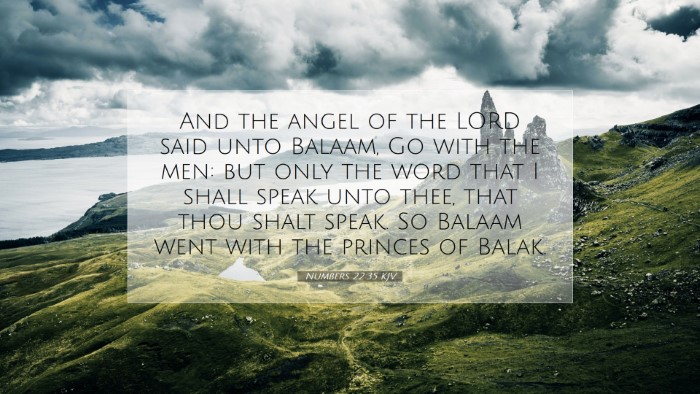Commentary on Numbers 22:35
Numbers 22:35 presents a significant episode in the narrative of Balaam, a pivotal character in the Israelite journey. This verse highlights a moment of divine intervention and revelation, demonstrating God's sovereignty over human intentions and actions. Below is a compilation of insights from notable public domain commentaries.
Contextual Background
Before delving into the specifics of Numbers 22:35, it's essential to understand the broader context. Balaam, a diviner, is approached by Balak, the king of Moab, who desires to curse the Israelites. However, God intervenes, confronting Balaam and thereby setting the stage for this extraordinary moment. The narrative addresses themes of obedience, divine authority, and the consequences of choices.
Verse Analysis
In Numbers 22:35, we read, "And the angel of the Lord said unto Balaam, Go with the men: but only the word that I shall speak unto thee, that thou shalt speak. So Balaam went with the princes of Balak." This verse encapsulates several critical themes:
- Divine Communication: The angel of the Lord serves as a messenger, emphasizing that Balaam's words must align with God's will. This solicits reflection on the authority of God in shaping human speech and action.
- Conditional Permission: God's permission for Balaam to go underscores that while divine sovereignty exists, human agency is also accounted for. The caveat of speaking only what God commands indicates a clear boundary in Balaam's autonomy.
- Obedience to Divine Will: The verse starkly portrays the expectation of obedience. Balaam’s journey is conditioned upon his fidelity to God’s directives, which serves as a metaphorical lesson on submission to divine authority.
Commentary Insights
Matthew Henry's Commentary
Matthew Henry notes that Balaam’s encounter with the angel reveals not only his character but also God's intention to guide him. Henry emphasizes that the permission granted to Balaam to proceed was one laden with caution—the necessity to declare only God's message was paramount. This signal serves as a reminder of the consequences of deviating from divine instruction.
Albert Barnes' Notes on the Whole Bible
Barnes provides insight into Balaam’s precarious situation. He emphasizes that although Balaam was given permission to proceed, it was under strict guidelines. There is a spiritual undertone suggesting that knowledge about God does not equate to wisdom. Barnes further highlights that Balaam's initial reluctance to comply with Balak's request demonstrates an awareness of the potential moral corruption involved in cursing God’s chosen people.
Adam Clarke's Commentary
Adam Clarke elaborates on the divine symbolism present within the text. He points out that the encounter with the angel is a pivotal warning, showcasing God's will in direct opposition to human ambition. Clarke underscores that the necessity for Balaam to speak only what God commanded illustrates the importance of divine truth in prophetic declarations. Through this perspective, the text is seen as a profound theological reflection on the relationship between humanity and the divine.
Theological Implications
The narrative surrounding Numbers 22:35 integrates several theological principles that resonate with diverse audiences, particularly pastors, students, theologians, and biblical scholars:
- The Sovereignty of God: The control that God exercises over Balaam's words frames the discussion around divine sovereignty, emphasizing that God allows human actions but remains in command of the overall outcome.
- Ethics of Prophecy: The ethical dimension of prophetic ministry is highlighted, urging those who speak on behalf of God to remain grounded in truth and obedience. This bears relevance for contemporary pastoral practice and theological discourse.
- The Nature of Disobedience: Balaam's character serves as a cautionary example, illustrating the risk of succumbing to temptation and the peril of pursuing personal gain at the expense of divine instruction.
Conclusion
Numbers 22:35 is not merely an isolated historical account but a narrative rich with theological depth and ethical contemplation. It serves as a reminder of the necessity for obedience to God’s directives, the importance of divine communication in our lives, and the ever-present reality of human decision-making in relation to divine sovereignty. As pastors, students, theologians, and scholars engage with this text, they are invited to reflect on their roles in proclaiming God’s truth and aligning their lives with His will.


